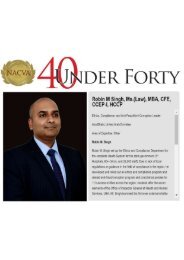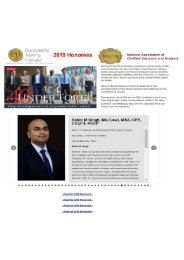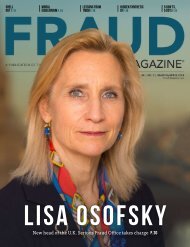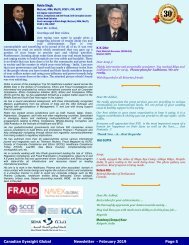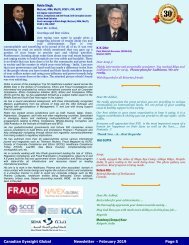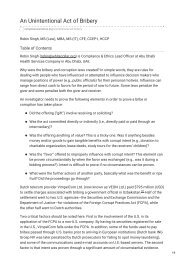Confronting the challenges of cross-border fraud examinations Part 2
Yet another article by a #Leader in the field of #Fraud #Examnation and #Complaince and #ethics. This time #part 2 of the #challenges of #cross-border #fraud #examinations by #Robin #Singh #whitecollarinvestigator.com #Whutecollar.org
Yet another article by a #Leader in the field of #Fraud #Examnation and #Complaince and #ethics. This time #part 2 of the #challenges of #cross-border #fraud #examinations
by #Robin #Singh #whitecollarinvestigator.com #Whutecollar.org
You also want an ePaper? Increase the reach of your titles
YUMPU automatically turns print PDFs into web optimized ePapers that Google loves.
‘machine learning’<br />
fights <strong>fraud</strong> P. 16<br />
anonymous shells<br />
rising P. 20<br />
<strong>fraud</strong>ulent<br />
diamonds P. 28<br />
winning back<br />
tipsters P. 44<br />
trust us ... we<br />
wouldn’t lie P. 48<br />
VOL. 33 | NO. 3 | MAY/JUNE 2018<br />
Fraud-Magazine.com<br />
This reporter exposed <strong>the</strong><br />
massive 1MDB scandal in<br />
Malaysia. Now she says<br />
democracies need strong,<br />
courageous media to help<br />
protect <strong>the</strong> public against<br />
<strong>the</strong> powerful, p. 36.
FRAUD BASICS<br />
Fundamentals for all<br />
<strong>Confronting</strong> <strong>the</strong> <strong>challenges</strong><br />
<strong>of</strong> <strong>cross</strong>-<strong>border</strong> <strong>fraud</strong><br />
<strong>examinations</strong><br />
<strong>Part</strong> 2 <strong>of</strong> 2<br />
As your organization grows,<br />
its business could expand<br />
into new nations. You<br />
might be conducting <strong>fraud</strong> <strong>examinations</strong><br />
in cultures with unfamiliar social<br />
customs, laws and judicial systems. As<br />
I covered in part one in <strong>the</strong> January/<br />
February issue, you should have a solid<br />
<strong>cross</strong>-<strong>border</strong> investigative plan before<br />
you tackle a case with roots in several<br />
different countries.<br />
In part two, we’ll cover assessing<br />
legal and cultural considerations, specifics<br />
<strong>of</strong> your plan, reporting findings<br />
and remediation a<strong>cross</strong> <strong>border</strong>s.<br />
Assess legal and cultural<br />
considerations<br />
Before <strong>the</strong> examination begins, you<br />
must discuss with in-house counsel<br />
if attorney-client privilege laws will<br />
protect it. You also must understand<br />
<strong>the</strong> laws <strong>of</strong> <strong>the</strong> area in which you’re<br />
investigating because <strong>the</strong>y might not<br />
align with international corporate law.<br />
You’ll always have to tweak your investigations<br />
to comply with local laws<br />
and culture.<br />
within:<br />
For example, corruption is dealt<br />
• The U.S. under <strong>the</strong> Foreign Corrupt<br />
Practices Act (FCPA) and some aspects<br />
<strong>of</strong> <strong>the</strong> USA Patriot Act.<br />
• The U.K. under <strong>the</strong> Anti-Terrorism,<br />
Crime and Security Act 2001, which<br />
includes extraterritorial provisions<br />
relating to corruption.<br />
• Australia under <strong>the</strong> Commonwealth<br />
Criminal Code Act 1995, which makes<br />
it an <strong>of</strong>fense to bribe a foreign public<br />
<strong>of</strong>fcial, whe<strong>the</strong>r in Australia or in<br />
ano<strong>the</strong>r country.<br />
• Germany via <strong>the</strong> federal government’s<br />
complete legal framework<br />
from <strong>the</strong> Prevention <strong>of</strong> Corruption,<br />
2004, that includes an anti-corruption<br />
code <strong>of</strong> conduct. The German<br />
penalty code and criminal procedure<br />
law allows <strong>the</strong> pursuit <strong>of</strong> employees<br />
as long as <strong>the</strong> act has taken place on<br />
German soil.<br />
Also, consult regulations <strong>of</strong> economic<br />
bodies, such as <strong>the</strong> Organisation<br />
for Economic Co-operation and Development<br />
(OECD).<br />
Many countries don’t have defined<br />
legal and political systems, especially<br />
those who have been or are engaged in<br />
war. (While once working on an investigation<br />
in a country at war, I had to plan<br />
every step to perfection or I might have<br />
had to say adios to <strong>the</strong> world.) That’s<br />
when an astute understanding <strong>of</strong> those<br />
countries’ cultures (unwritten rules <strong>of</strong><br />
how things are done) comes in handy.<br />
KPMG, in its report, “Cross-<strong>border</strong><br />
investigations: Are you prepared for <strong>the</strong><br />
challenge?” (KPMG International, 2013,<br />
tinyurl.com/ycn66vej) says that cultural<br />
differences remain one <strong>of</strong> <strong>the</strong> top three<br />
<strong>challenges</strong> in conducting <strong>cross</strong>-<strong>border</strong><br />
investigations — up to 37 percent in<br />
2013 from 26 percent in 2007.<br />
An obvious cultural barrier is body<br />
and spoken language. For example, in<br />
North American countries it’s fine to<br />
look directly into ano<strong>the</strong>r’s eyes when<br />
speaking — even when lying! However,<br />
in some countries it’s considered rude<br />
to ever look someone straight in <strong>the</strong><br />
eye. And watch out for social faux pas:<br />
Tipping wait staff in <strong>the</strong> U.S. is generally<br />
expected; in Japan it’s an insult.<br />
Miscommunication and lack <strong>of</strong><br />
awareness <strong>of</strong> a local language can be<br />
disastrous for investigators who don’t<br />
fully understand <strong>the</strong> jurisdiction in<br />
which <strong>the</strong>y’re operating. In Middle<br />
Eastern countries words usually are<br />
as valid as written contracts, so many<br />
make deals verbally. However, you<br />
might receive a response such as<br />
“Inshallah” to a verbal request for a<br />
meeting, which indicates “if Allah wills<br />
it.” But don’t take it as an affrmative<br />
unless you’re setting up an electronic<br />
meeting. Depend on your translator.<br />
You might have to tweak language<br />
to respect diverse cultures and customs.<br />
For example, in <strong>the</strong> Middle East,<br />
because <strong>the</strong> word “investigation” might<br />
disturb some, use words like “special<br />
review” and “analysis.” And ra<strong>the</strong>r than<br />
saying “whistleblower,” “informant”<br />
12 FRAUD MAGAZINE MAY/JUNE 2018 FRAUD-MAGAZINE.COM
By Robin Singh, CFE, LPEC<br />
or “witness,” use “employee” or<br />
“colleague.”<br />
Find subject matter experts in <strong>the</strong><br />
regions in which you’ll be investigating<br />
and frequently run your plans by <strong>the</strong>m.<br />
Also, depend heavily on your<br />
organization’s administration staff in<br />
<strong>the</strong> areas in which you’re investigating.<br />
Plan <strong>the</strong>m in your budget. You simply<br />
can’t conduct <strong>cross</strong>-<strong>border</strong> <strong>examinations</strong><br />
without reliable people who know<br />
<strong>the</strong> intricacies and peculiarities <strong>of</strong> <strong>the</strong>ir<br />
jurisdictions. In hostile environments,<br />
plan for armored vehicles, local escorts<br />
and trained, savvy drivers.<br />
Ask management for a hefty<br />
miscellaneous budget for intercity<br />
traveling, security, vehicles, translators,<br />
witnesses living in safe houses and<br />
emergencies.<br />
If management is balking on supplying<br />
enough cash for miscellaneous<br />
spending, tell <strong>the</strong>m that <strong>the</strong> organization’s<br />
reputation could suffer if you<br />
don’t have suffcient funding for your<br />
investigation.<br />
Specifics <strong>of</strong> your <strong>cross</strong><strong>border</strong><br />
investigation<br />
Acquisition, seizure<br />
and collection <strong>of</strong> data<br />
Most <strong>of</strong> your relevant data will be like<br />
<strong>the</strong> unseen 90 percent <strong>of</strong> an iceberg:<br />
submerged and diffcult to access.<br />
Collecting relevant information is a<br />
crucial step <strong>of</strong> any examination, but differing<br />
data privacy laws and procedures<br />
<strong>of</strong>ten make this process challenging.<br />
This is ano<strong>the</strong>r area where it’s important<br />
to understand <strong>the</strong> local laws and<br />
procedures.<br />
Remember <strong>the</strong>se principles when<br />
you’re collecting data:<br />
• You must obtain explicit permission<br />
from those who own data — physical<br />
or in electronic form — that you’re<br />
processing, and <strong>the</strong>y must always be<br />
able to access it at any time.<br />
• Of course, you must process all data<br />
accurately.<br />
• You should only process data — in<br />
fair and lawful ways — for purposes<br />
<strong>of</strong> <strong>the</strong> examination.<br />
• If you’re in <strong>the</strong> European Union (EU),<br />
you should only share data with those<br />
located in countries that can afford<br />
adequate protection to data in <strong>the</strong><br />
eyes <strong>of</strong> <strong>the</strong> European Commission<br />
(EC).<br />
Application <strong>of</strong> datacollection<br />
principles<br />
Applying <strong>the</strong>se principles in practice,<br />
particularly in <strong>the</strong> context <strong>of</strong> a <strong>cross</strong><strong>border</strong><br />
Foreign Corrupt Practices Act<br />
investigation, isn’t necessarily straightforward.<br />
Say, for example, providing<br />
notice to wrongdoers that you’re<br />
Many countries don’t<br />
have defined legal and<br />
political systems, especially<br />
those who have<br />
been or are engaged<br />
in war.<br />
collecting <strong>the</strong>ir data obviously will tip<br />
<strong>the</strong>m <strong>of</strong>f that you’ve begun an examination.<br />
Or when you’re looking for<br />
evidence, exculpatory or o<strong>the</strong>rwise, it<br />
might be technologically impossible to<br />
examine limited data. And non-EU legal<br />
requirements or requests from non-<br />
EU authorities don’t overrule EU data<br />
protection laws and consequently might<br />
not be lawful.<br />
The EC has numerous exceptions<br />
for transferring data outside <strong>the</strong> EU.<br />
While transferring data outside <strong>the</strong> EU<br />
is sometimes tedious, you can adopt<br />
— at a minimum — risk mitigation<br />
strategies, such as determining <strong>the</strong><br />
exact location <strong>of</strong> <strong>the</strong> data, transferring<br />
de-identified data, filtering data prior<br />
to transfer, etc. (De-identified data, <strong>of</strong><br />
course, doesn’t disclose identities.)<br />
Interviewing<br />
Be culturally sensitive when you’re<br />
interviewing. Always remember that<br />
<strong>the</strong> person sitting in front <strong>of</strong> you is only<br />
a potential alleged <strong>fraud</strong>ster no matter<br />
how much evidence you might have.<br />
During a <strong>cross</strong>-<strong>border</strong> examination,<br />
you must realize that many countries<br />
allow employees to refuse to cooperate<br />
or allow <strong>the</strong>m to have limited access to<br />
files that identify <strong>the</strong>m as relevant. And<br />
your organization’s jurisdictional documents<br />
might not be valid in a country<br />
like Afghanistan. Again, understanding<br />
<strong>the</strong> culture can help with this process.<br />
Sometimes <strong>the</strong> only weapon you might<br />
have is <strong>the</strong> skill <strong>of</strong> persuasion.<br />
During an interview, always have<br />
your trustworthy translator in <strong>the</strong> room.<br />
(Never use family members or friends <strong>of</strong><br />
<strong>the</strong> interviewee.) Even if <strong>the</strong> interviewee<br />
speaks in your language, <strong>the</strong> local<br />
experienced translator can help with<br />
dialects, slang and local jargon.<br />
Make sure your body language<br />
radar is up and running constantly to<br />
make sure movements, expressions and<br />
words all coincide.<br />
Analysis<br />
Midnight brainstorming sessions with<br />
your team (and your daily investigation<br />
diary) will help you fill in <strong>the</strong> blanks on<br />
your linked analysis. Don’t hesitate consulting<br />
with your SMEs, your in-country<br />
consultants and onsite organization staff.<br />
Reporting findings<br />
After you’ve completed your examination,<br />
your team needs to report its<br />
findings to <strong>the</strong> authorities. You must<br />
understand <strong>the</strong> chain <strong>of</strong> reporting in <strong>the</strong><br />
country in which you’ve conducted <strong>the</strong><br />
FRAUD-MAGAZINE.COM MAY/JUNE 2018 FRAUD MAGAZINE 13
FRAUD BASICS<br />
Fundamentals for all<br />
examination. Their privacy laws might<br />
not allow some <strong>of</strong> <strong>the</strong> information to be<br />
seen outside <strong>of</strong> <strong>the</strong> jurisdiction, such as<br />
individuals’ names, financial information<br />
or personal data. Therefore, establish<br />
<strong>the</strong> proper data export channels<br />
before providing a report (even a draft<br />
<strong>of</strong> a report) to management or directors<br />
outside <strong>of</strong> <strong>the</strong> country. Do likewise<br />
for reports and materials prepared by<br />
experts and consultants.<br />
Remediation a<strong>cross</strong> <strong>border</strong>s<br />
Remediation is <strong>the</strong> final step <strong>of</strong> <strong>the</strong><br />
process before formal charges are<br />
brought against an individual or organizations.<br />
It’s critical that organizations<br />
punish employees proportionately to<br />
<strong>the</strong> magnitude <strong>of</strong> involvement in <strong>the</strong><br />
unethical conduct and in line with<br />
local regulations. For example, certain<br />
countries require employers to notify an<br />
employee if <strong>the</strong>y’re going to be terminated<br />
for cause or without permissible<br />
cause. Even if <strong>the</strong> evidence appears to<br />
implicate a person, <strong>the</strong> labor laws in<br />
certain countries contain higher standards<br />
that must be fulfilled to justify a<br />
termination for cause.<br />
Ano<strong>the</strong>r key area <strong>of</strong> remediation<br />
is to address <strong>the</strong> inadequate, insufficient<br />
or non-operating/ineffective<br />
controls or procedures that allowed <strong>the</strong><br />
unethical act to occur. Implementing<br />
<strong>the</strong>se changes to <strong>the</strong> existing controls<br />
(such as a <strong>fraud</strong> response plan or<br />
anti-corruption/compliance program)<br />
might reduce <strong>the</strong> severity <strong>of</strong> <strong>the</strong> charges<br />
against a company.<br />
Cross-<strong>border</strong> <strong>fraud</strong><br />
<strong>examinations</strong> are unique<br />
As <strong>fraud</strong> examiners, we deal with this<br />
paradox: Organizations are continually<br />
expanding globally, but <strong>border</strong><br />
restrictions are tightening. So, we must<br />
always be prepared with a preemptive<br />
<strong>cross</strong>-<strong>border</strong> <strong>fraud</strong> examination plan<br />
that includes understanding <strong>of</strong> changing<br />
countries’ laws and cultures. Your<br />
success depends on it. n FM<br />
Robin Singh, CFE, LPEC, is <strong>the</strong><br />
compliance and <strong>fraud</strong> control department<br />
lead <strong>of</strong>fcer at Abu Dhabi Health<br />
Services Company – SEHA (Government<br />
<strong>of</strong> Abu Dhabi). Reach him at:<br />
robinsingh002@yahoo.com.<br />
The opinions expressed in this column<br />
are those <strong>of</strong> <strong>the</strong> author and don’t reflect <strong>the</strong><br />
opinions <strong>of</strong> SEHA or its business entities or<br />
its affliates.<br />
SAVE THE DATE<br />
October 25, 2018 | Washington, D.C.<br />
Join us for <strong>the</strong> can’t-miss anti-<strong>fraud</strong> training event for<br />
law enforcement and government pr<strong>of</strong>essionals.<br />
Register by<br />
Sept. 29 to<br />
SAVE<br />
$200!<br />
Visit ACFE.com/LEGAsummit<br />
to learn more.<br />
14 FRAUD MAGAZINE MAY/JUNE 2018 FRAUD-MAGAZINE.COM







